From our origins as a weekly Sunday night concert series and photocopied ‘zine to becoming a non-profit institution presenting year-round concerts, festivals, talks and research projects, Wavelength has always put artists and the community first. Dive back into our 20+ years of history supporting emerging artists and local music culture in Toronto and beyond. Timeline written by Jonny Dovercourt.
You Are Here (2020-present)
Little do we know that the momentous, five-night celebration of Wavelength’s 20th anniversary in Feb. 2020 — including a one-night return to our former Sunday night home Sneaky Dee’s — will be one of the last in-person music festivals in Toronto before COVID-19. The pandemic shuts down all live music in Ontario for 18 months, but Wavelength makes the most of the spare time, presenting ever more creative livestream concerts and talks, while organizing our archives behind the scenes and launching new research projects, including “Reimagining Music Venues.” In-person events return with the “TOPS x Wavelength” film and music series at Fort York over Labour Day weekend 2021, and in 2022 we relaunch our summer festivities as the Wavelength Summer Thing.
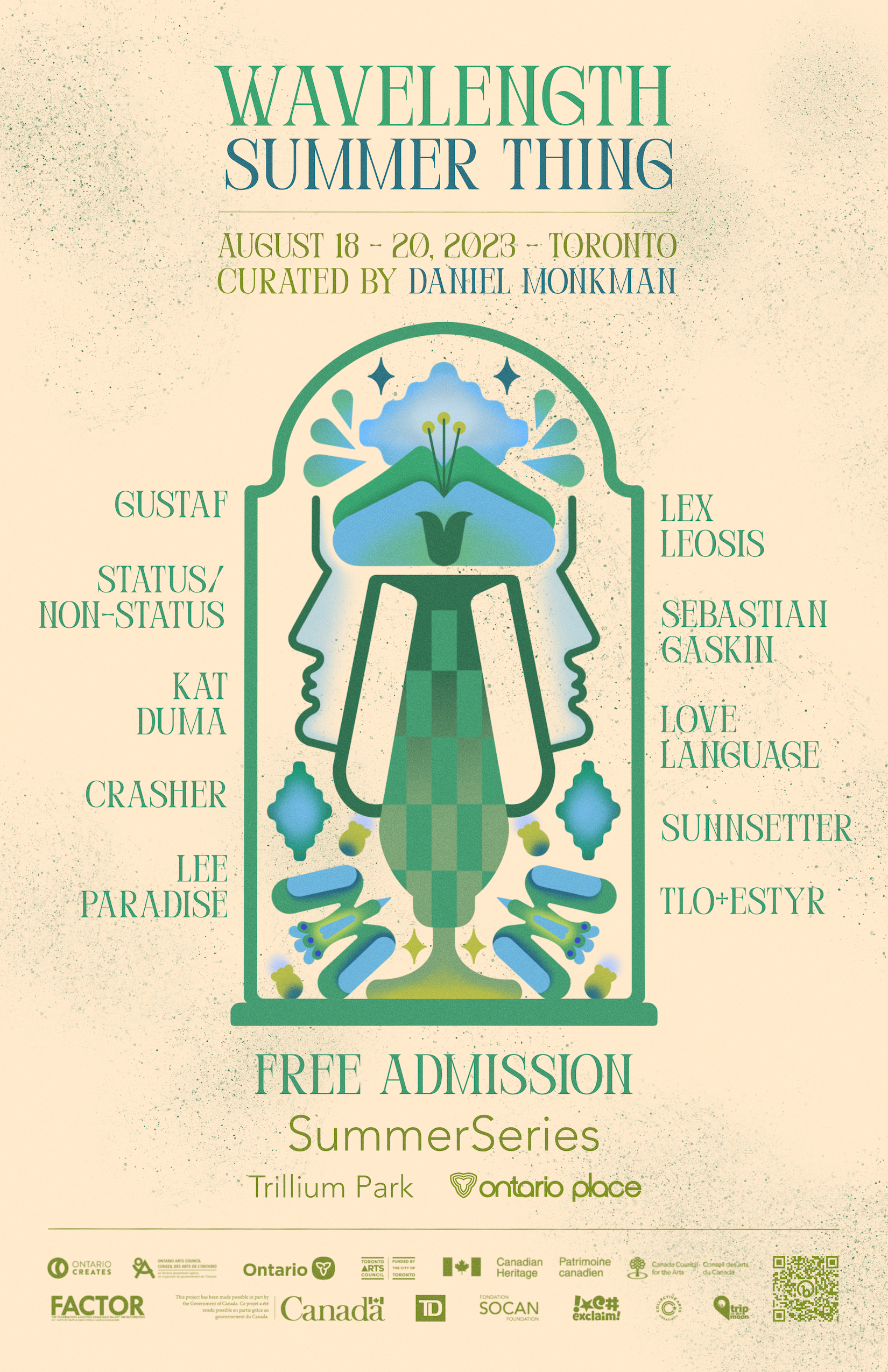
2023 marks Wavelength’s first full year of in-person shows post-pandemic, which exemplifies our ongoing commitment to diverse programming and innovative spaces — kicking off with a collab show at Collective Arts Brewing in Hamilton, Ontario. The Wavelength Winter Festival highlights Indigenous performers and pays tribute to Montreal's Constellation Records, while the Summer Thing returns to a green, lakeside location at Trillium Park for a free weekend of music and arts. Two research projects, Band Together and Reimagining Music Venues, explore remote music collaboration and possibilities for innovation and conservation of live music spaces. Memorable shows include events at the Royal Ontario Museum, Tkaronto Music Festival, and unique venues like Filipino club Sari Not Sari and furniture design studio Brothers Dressler.
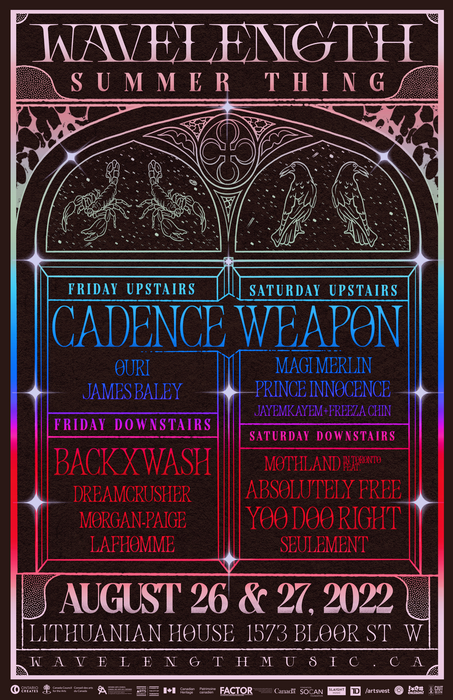
Though the COVID-19 Omicron variant kiboshes an in-person Wavelength Winter Festival, things begin opening up for good a few months later. In May, Wavelength returns to full-capacity events and, in August, relaunches its summer event as the two-night Wavelength Summer Thing. It features much of that year’s planned Winter Festival lineup, with guest curation by industrial horrorcore artist Backxwash, Wavelength veteran Cadence Weapon, and Montreal psych-rock collective Mothland. Finally, Anishinaabe musician/composer Daniel Monkman (Zoon, Ombiigizi) starts their year-long guest-curation engagement. Memorable performances include Ombiigizi’s album launch, and a Halloween party fittingly doubling as the album launch for gothic drone-rockers Bonnie Trash.
The Festival Era (2015-2019)
Wavelength turns 15 and celebrates its “Past, Present and Future” with a Pop-Up Gallery of show posters and photography at Huntclub Studios on College, hosting a panel discussion on Toronto’s “Music City” moment, continuing the theme at that February’s Winter Festival. Summertime levels up when our Island festival is relaunched as Camp Wavelength — three days of music and camping in an artsy lakeside wonderland. Hip-hop emcee Haviah Mighty and Afro-pop star Pierre Kwenders play the fest before going on to win the Polaris Music Prize. But 2017 sees flooding on Toronto Island force the festival into the city, and Wavelength’s summer festival finds new homes at Fork York and Stackt Market. Our winter festival, meanwhile, gets cozier at the Garrison and year-round Wavelength presents more conceptual concerts, bike tours, library talks, and shows in woodworking studios.
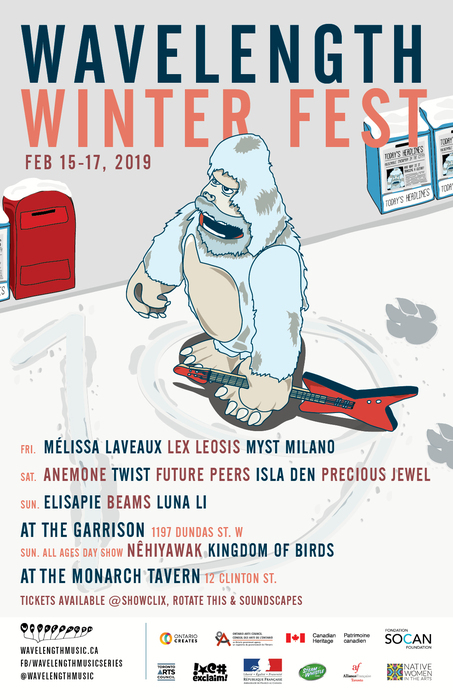
The 19th Wavelength Winter Festival brings a sense of coziness that, in hindsight, is much-needed, with massive majesty palm plants turning the Garrison into a therapeutic greenhouse. We rebrand Camp Wavelength as the Wavelength Summer Music & Arts Festival and host it at Stackt Market. With live music inside and arts activities outside, it’s a nice city-side throwback to the early days of ALL CAPS! on the Island. Other memorable shows include two nights at woodworking studio Brothers Dressler on Sterling Road (one of our favourite alternative venues of all time), and “the new sound of Toronto hip-hop” with Swagger Rite, LolaBunz and 730Rarri.
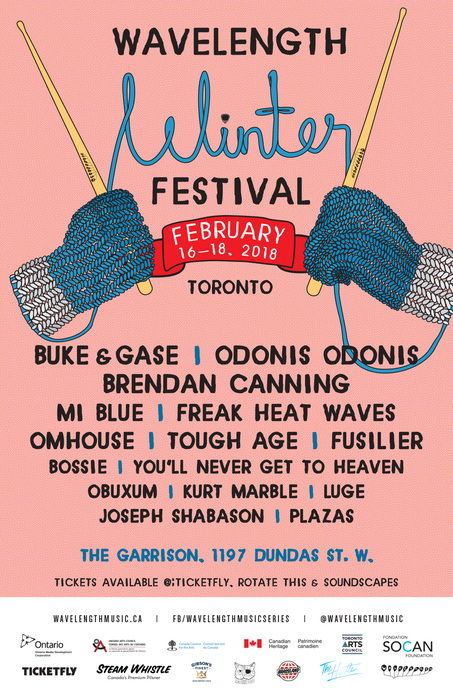
When Wavelength reaches voting age, we enter adulthood with another rebrand of our February anniversary festivities: it’s hereby known as the Wavelength Winter Festival, to distinguish it from its summer sibling. With Toronto Island no longer viable as a festival site post-flooding, Camp Wavelength finds a new home at Fort York’s Garrison Common, reinventing the fest as a two-day urban green space adventure themed, of course, “Fun Finds a Way.” Other memorable moments include experimental electronic artist Obuxum and R&B singer Kiyoya Amoah at the Toronto Public Library in Rexdale, and German “kosmische musik” pioneers Faust alongside Toronto analog-synth wizard Castle If.
The Monthly Era (2010-2014)
Wavelength closes out its epic 10-year run of 500 Sundays with “Wavelength 500,” a five-night blowout at five different venues, alongside a special 10th anniversary edition of the ‘zine. The series continues monthly at the Garrison and other spaces around Toronto — and continues to book new acts before they blow up, such as Grimes, who plays anniversary #11. Wavelength embraces its love of the outdoors by presenting more summer events including the ALL CAPS! Island Festival at Gibraltar Point on Toronto Island — which ramps up with the addition of overnight camping. Wavelength launches an Artist Incubator Program and takes a trio of Toronto bands on tour. And as it reaches the middle of its second decade, the growing organization benefits from professional leadership for the first time.
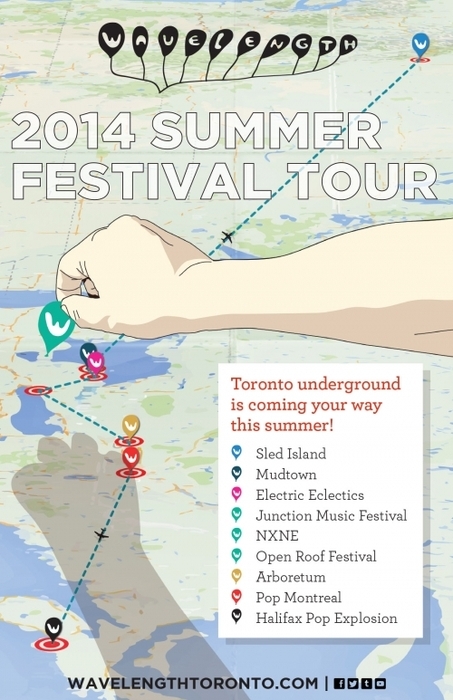
With ALL CAPS! retired, Wavelength hosts two mini outdoor summer festivals: the day-long Endless Summer at a vintage thrift market on Dundas, and the Wavelength Island Show, a one-off return to Artscape Gibraltar Point. Behind the scenes, growth in funding support allows Wavelength to benefit from professional leadership for the first time ever, and an invigorated Board and staff create the org’s first Strategic Plan. Memorable sets include grunge rockers Dilly Dally playing “A Madcap Night of Royal Debauchery” at Handlebar, and hip-hop emcee Jazz Cartier’s live debut.
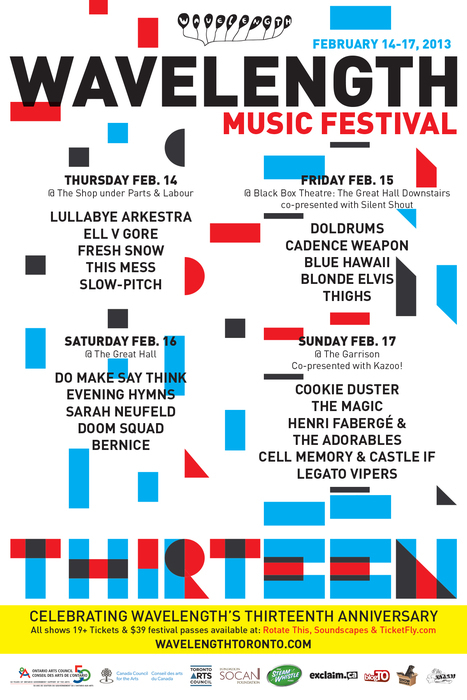
For our 13th birthday, a.k.a. #WL13, Wavelength enters its teen years by moving away from its anniversary roots and rebranding as the Wavelength Music Festival, four nights of shows plus three free all-ages afternoon in-stores. Ryan McLaren decides to retire the ALL CAPS! name, but not after the Final ALL CAPS! Island Festival, a perfect weekend of incredible weather and (for the first time) a fully outdoor stage setup. Wavelength also pilots an Artist Incubator program with an inaugural class of Toronto/Guelph bands Del Bel, Fresh Snow, and Most People. Memorable sets include a night of electro-pop in a notorious swingers’ club, and the first-ever Wavelength Roadshow, taking the Incubator artists across Ontario and Quebec.
The Internet Era (2005-2009)
The final issue of the Wavelength ‘zine is printed in February 2005, as Wavelength celebrates its fifth birthday, though our inimitable band interviews are still published online. The Toronto music community gathers on the Internet message board Stillepost, and show promotion moves over to nascent social media platforms. In the wake of international indie breakouts, the local music scene grows in strength and diversity, with acts like Cadence Weapon, METZ, Maylee Todd and the Weather Station taking the WL stage. Wavelength begins presenting more special events in alternative spaces outside of Sunday nights at Sneaky Dee’s, and makes steps towards professionalizing, including incorporating as a non-profit. In 2009, an Eye Weekly cover story announces that the upcoming 10th anniversary will mark the end of the weekly series — though it will continue as a monthly in the new decade. That fall, after seven years at Sneak’s, Wavelength finds a new home when the Garrison opens its doors on Dundas West.
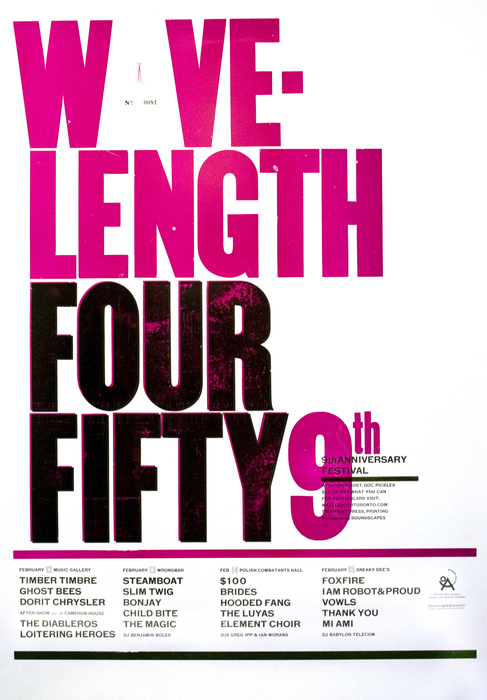
A cover story in Eye Weekly that announces the end of Wavelength’s weekly series a year ahead of time yields cries of “say it ain’t so” from the community, but fears are eschewed after the ninth-anniversary fest Wavelength 450 continues the exploration of new spaces and new faves, with packed houses all weekend, coinciding with a brand-new Ontario public holiday, Family Day. That fall, Wavelength relocates the weekly series one last time after seven years at Sneaky Dee’s, to a new club in Little Portugal called the Garrison. Memorable shows include Japandroids, METZ, Fugazi bassist Joe Lally, Sook-Yin Lee, and the Strumbellas years before hitting alt-country platinum with “Spirits.”
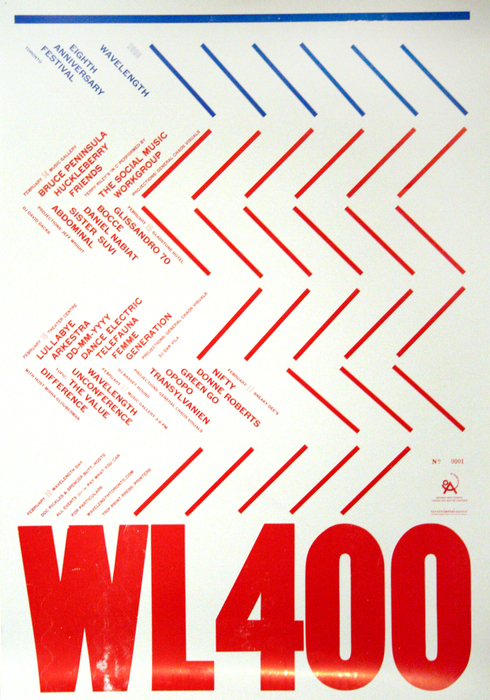
Wavelength continues to produce and present quarterly Special Events outside its weekly series, including the Kalimba Summit, centring on the titular southern African thumb piano. Midway through the year, the WL programmers make a big decision: with Sunday turnout gradually declining and more of the WL “vibe” found at the Special Events, the weekly Sunday night series will end 18 months later, on its 10th anniversary, and continue on as a monthly. Memorable performances include a sold-out benefit for the Music Gallery featuring Jens Lekman, Final Fantasy, and Katie Stelmanis (later of Austra), and an early Tune-Yards show before Merrill Garbus relocates to Oakland.
The Zine Era (2000-2004)
Wavelength launches in February 2000 as a weekly Sunday-night series at cozy second-floor club Ted’s Wrecking Yard in Little Italy. Post-rock and shoegaze bands share stages with free-jazzers and electronic experimentalists. Admission is Pay-What-You-Can and the series is promoted through a photocopied monthly ‘zine that interviews the performers. Soon, Wavelength becomes a social hub for Toronto’s growing indie scene, and hosts key early gigs by Broken Social Scene, Constantines, and Hidden Cameras. Tragedy strikes when Ted’s Wrecking Yard unexpectedly closes in late 2001, but the following year the weekly series moves to College Street nacho palace Sneaky Dee’s, which becomes its longest-running home. 2003-04 sees Canadian bands explode onto the world stage, and Wavelength is swept up in the optimistic era of “Torontopia.” The WL anniversary fest evolves into a multi-venue experience. The ‘zine gets printed in glorious colour, until the Internet takes over.
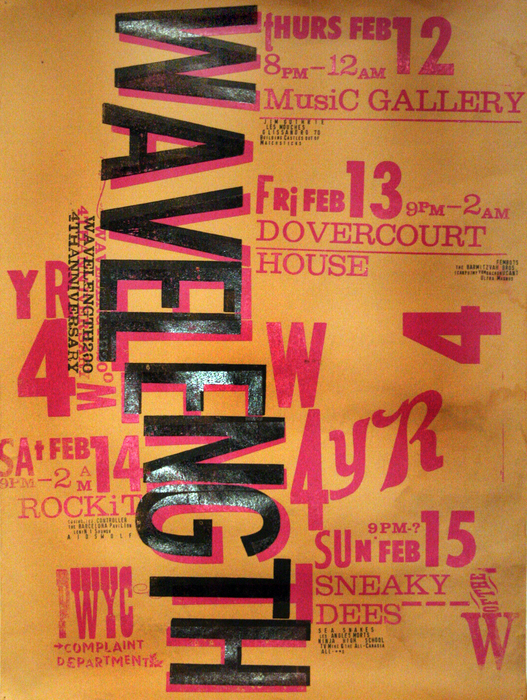
Wavelength finds its footing in an increasingly Internet-reliant world, establishing itself as a key touring stop for national acts and building community through local message boards. The fun continues IRL: Sunday nights at Sneaky Dee’s remain a dependable staple on College Street while the artsy gentrification ramps up on Queen West. Memorable performances include California art-rockers Xiu Xiu, one of Owen Pallett’s first shows as solo violin looper Final Fantasy, Toronto femcee Masia One, and Fucked Up headlining a raging Halloween party with actual Jack-o-Lanterns on their heads.
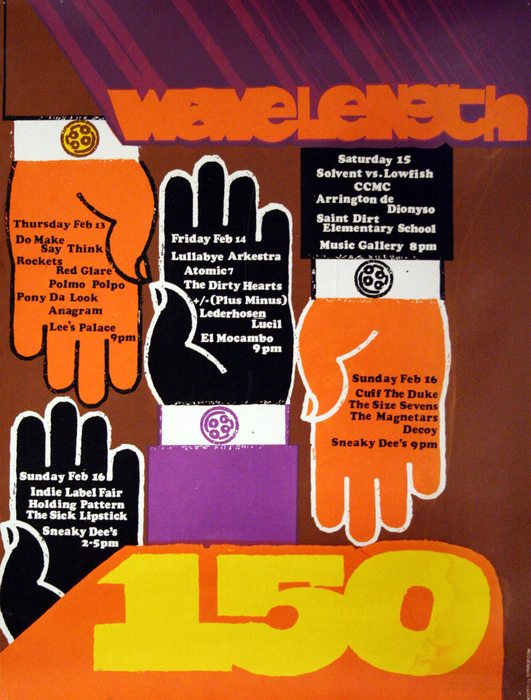
Wavelength perfects its Winter Festival formula — a kickass lineup combined with an intriguing mix of venues over one long weekend — and overhaul the ‘zine after a brief hiatus due to behind-the-scenes changes with full-colour covers, a brand-new logo, and an epic dance-punk launch party. It’s right in time for Torontopia, a new movement of civically-minded arts initiatives bolstered by the day-long Northeast blackout and a progressive new mayor. Memorable performances include Holy Fuck’s first-ever set, manic freak-folk by Owen Pallett’s band Les Mouches, and Can’s Damo Suzuki backed up by Wavelength all-stars.
Pre-History: 1993-1999
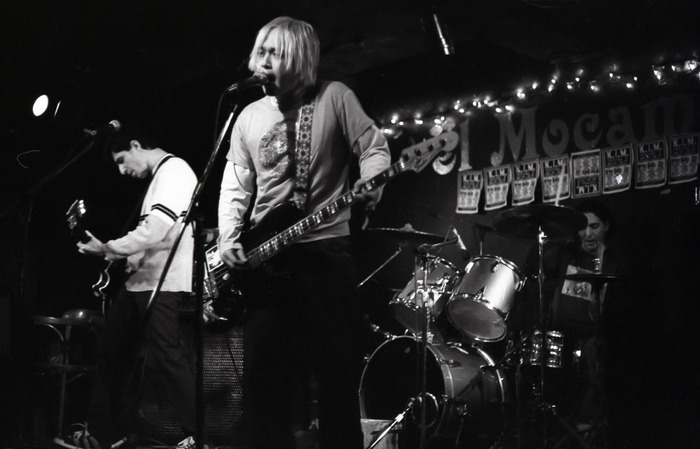
Throughout the ‘90s, Toronto’s local music scene is thriving. Though major labels are out to lunch, a DIY spirit flourishes due to plentiful music venues, affordable living/rehearsal space, and supportive media. Near the end of the decade, a crew of musicians and friends decide to officially form a grassroots artists’ collective to host a weekly Sunday-night concert series accompanied by a monthly print ‘zine and website. They call it: Wavelength.
